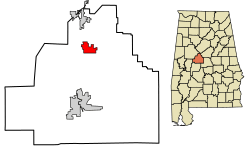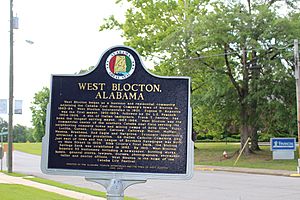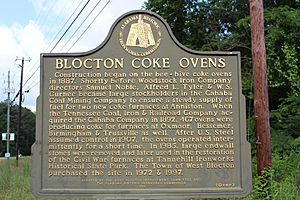West Blocton, Alabama facts for kids
Quick facts for kids
West Blocton, Alabama
|
||
|---|---|---|
|
||

Location of West Blocton in Bibb County, Alabama
|
||
| Country | United States | |
| State | Alabama | |
| County | Bibb | |
| Founded | August 28, 1883 | |
| Incorporated | 1901 | |
| Area | ||
| • Total | 4.822 sq mi (12.489 km2) | |
| • Land | 4.798 sq mi (12.427 km2) | |
| • Water | 0.024 sq mi (0.063 km2) | |
| Elevation | 495 ft (151 m) | |
| Population
(2020)
|
||
| • Total | 1,217 | |
| • Estimate
(2023)
|
1,189 | |
| • Density | 247.8/sq mi (95.68/km2) | |
| Time zone | UTC−6 (Central (CST)) | |
| • Summer (DST) | UTC−5 (CDT) | |
| ZIP Code |
35184
|
|
| Area code(s) | 205 and 659 | |
| FIPS code | 01-80928 | |
| GNIS feature ID | 0153935 | |
| Sales tax | 10.0% | |
West Blocton is a small town in Bibb County, Alabama, United States. In 2020, about 1,217 people lived there. It is known for its interesting history and natural beauty.
Contents
History of West Blocton
West Blocton was built on land that used to belong to Uriah Smith. It is very close to a place called Blocton. Blocton was a "company town." This means a company built and owned most of the town.
Many of the first people who moved to West Blocton came from different countries in Europe. A large group of these new residents were from Italy. They came to work in the mines in the area. West Blocton even has a neighborhood called Little Italy because of this history.
Geography and Location
West Blocton is in the northern part of Bibb County. It is located at the southern end of the Appalachian Mountains. These mountains stretch for many miles across the eastern United States.
The town is about halfway between two larger cities: Birmingham and Tuscaloosa. Alabama State Route 5 goes through West Blocton. This road leads north to Woodstock and south to Brent and Centreville. Centreville is the main town of Bibb County.
West Blocton is about 7 miles (11 km) south of Interstate 20 and Interstate 59. These are major highways.
The town covers about 4.822 square miles (12.49 square kilometers) of land. Only a very small part of this area is water.
West Blocton Coke Ovens Park
The West Blocton Coke Ovens Park is a special place. It mixes history with nature. You can learn about Alabama's industrial past here. The "coke ovens" were very important. They made a special fuel called coke. This coke was used to make steel for the southern United states.
Population and People
| Historical population | |||
|---|---|---|---|
| Census | Pop. | %± | |
| 1910 | 892 | — | |
| 1920 | 1,023 | 14.7% | |
| 1930 | 1,070 | 4.6% | |
| 1940 | 1,317 | 23.1% | |
| 1950 | 1,280 | −2.8% | |
| 1960 | 1,156 | −9.7% | |
| 1970 | 1,172 | 1.4% | |
| 1980 | 1,147 | −2.1% | |
| 1990 | 1,468 | 28.0% | |
| 2000 | 1,372 | −6.5% | |
| 2010 | 1,240 | −9.6% | |
| 2020 | 1,217 | −1.9% | |
| 2023 (est.) | 1,189 | −4.1% | |
| U.S. Decennial Census 2020 Census |
|||
2020 Census Information
In 2020, there were 1,217 people living in West Blocton. There were 506 households and 334 families.
The table below shows the different groups of people living in West Blocton in 2020.
| Race | Number | Percentage |
|---|---|---|
| White (NH) | 967 | 79.46% |
| Black or African American (NH) | 162 | 13.31% |
| Native American or Alaska Native (NH) | 1 | 0.08% |
| Asian (NH) | 5 | 0.41% |
| Pacific Islander (NH) | 1 | 0.08% |
| Some Other Race (NH) | 3 | 0.20% |
| Mixed/Multi-Racial (NH) | 34 | 2.80% |
| Hispanic or Latino | 44 | 3.62% |
| Total | 1,217 | 100.00% |
2010 Census Information
In 2010, West Blocton had 1,240 people. There were 494 households. About 22.3% of these households had children under 18. Many households (49.6%) were married couples.
The population was spread out by age. About 22.8% were under 18 years old. About 17.7% were 65 years or older. The average age in the town was 41.1 years.
Economy and Jobs
West Blocton's economy used to be all about coal mining. Over time, the mining industry left the town. Even without many jobs, the town has stayed active. People still live there and keep the community going.
Famous People from West Blocton
Many interesting people have connections to West Blocton:
- Mel Allen was a famous sports broadcaster for the New York Yankees. He often visited West Blocton. His grandfather lived there.
- Elmo Israel Ellis was Mel Allen's cousin. He was a pioneer in radio broadcasting in Atlanta, Georgia. He was the top student at West Blocton High School in 1936.
- Sammie Lee Hill was born in West Blocton in 1986. He became a professional football player. He was drafted by the Detroit Lions in 2009.
- Debra Marshall was raised in West Blocton. She is known for her time in professional wrestling with WCW and WWE.
- Frank Pratt played baseball for the Chicago White Sox. He was born in Blocton, a town near West Blocton that no longer exists.
- Mildred Lee Scudder wrote children's books. She was born in Blocton in 1908.
- Colonel James B. Swindal was a pilot for Air Force One. He flew Presidents John F. Kennedy and Lyndon B. Johnson. He was born in West Blocton.
- Rufus Parker is a well-known inventor. He created a carbon steel wheel lock for large trucks. He also invented an "oil jaw lock" to stop oil thefts. Mr. Parker was born and raised in West Blocton. He served in the US Army during the Korean War. After the army, he became the first person in US history to get a small business loan. He later owned a nightclub with blues musician Albert King.
Education in West Blocton
The Bibb County School District is in charge of schools in the area. They operate West Blocton High School.
Fun Facts About West Blocton
- West Blocton is famous for its old beehive ovens. These ovens were built in the late 1880s. They were used to make coke, a special fuel.
- A movie about the town was made in 2012. It is a documentary called West Blocton: Small Town, Big Heart. It tells the story of West Blocton from when it started as a coal mining town in 1884 until today.
Climate
West Blocton has a climate with hot, humid summers. The winters are usually mild to cool. This type of weather is called a humid subtropical climate.
See also
 In Spanish: West Blocton para niños
In Spanish: West Blocton para niños




